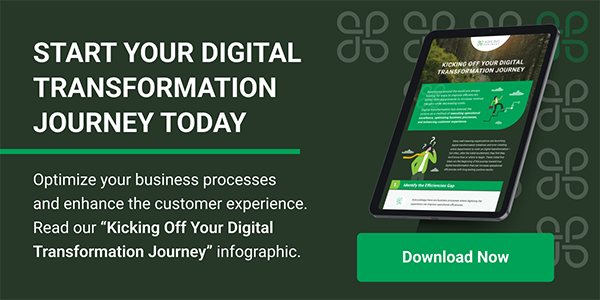Intelligent process automation (IPA) can be a powerful engine to modernize operations and achieve digital transformation. However, its adoption isn’t abundant because some companies see barriers to implementation, even if they understand its benefits. There are misconceptions about its complexity, or concerns that it is only meant for enterprise organizations.
As with any new process or technology adoption, there will be challenges. However, the payoff is substantial because intelligent process automation can move any business forward. To achieve implementation, you need to know what IPA is, its value, how to use it, and the essential steps to succeed. Keep reading to learn all this and more:
What Is Intelligent Process Automation?
Intelligent process automation refers to applying artificial intelligence (AI), machine learning, and optical character recognition (OCR) to robotic process automation (RPA). IPA converges fundamental process redesigns and RPA. IPA is superior to rules-based automation because its decision-making capabilities augment the standard automation parameters.
The Facets of IPA
- RPA bots accelerate repetitive, repeatable processes and eliminate the need for human intervention.
- OCR enhances data capture, converting semi-structured and unstructured data into structured formats. With OCR, RPA can expand further and automate more processes.
- Machine learning leverages statistical modeling and algorithms to learn and improve. As such, accuracy increases. You will be able to disperse machine learning after you obtain a high volume of data from RPA. With the extracted data, machine learning can classify by keywords or “read” invoices and documents.
- Finally, AI provides agility and insights into process improvement. AI is often just a mass of black box technology. That’s not the case with IPA. Rather, it has targeted AI that focuses on business outcomes.
With all these powerful pieces working together, you can derive substantial value.
What’s the Value of Intelligent Process Automation?
IPA offers advantages to every industry. Although automation is something every company wants to adopt, it’s not something to implement without defining what you want to achieve. IPA isn’t just adding a few automation steps to a workflow. It’s intelligent, meaning it’s part of a long-term strategy to revolutionize business processes.
The value of deploying IPA depends on that strategy. Overall, you can expect to improve efficiency and reduce transactional strain on employees. This is because it eliminates manual, expensive, and error-prone processes. A recent study quantified this value, finding that companies using IPA automated 50-70 percent of manual tasks, reducing process times by 50-60 percent.
IPA plays a role in optimizing many business department functions — the cost to execute the process is less and simultaneously the quality of output improves. Plus, employees are more productive and spend more time on higher-level work.
Additionally, IPA can drive innovation. Businesses often get stuck in their pursuit of digital transformation because processes are too manual and complex. IPA provides a new perspective on what is possible.
IPA also improves customer experiences. Customers have high demands for interactions, wanting them to be fast and frictionless. That’s caused many companies to offer more self-service support options. IPA can make these more seamless and improve them as the technology learns.
How Can You Use Intelligent Process Automation?
Wondering how you can use IPA to achieve goals and realize value? There are numerous applications for any company. That’s because every business is a collection of processes.
You will want to assess all processes to identify the best ways to deploy IPA. Many clients that come to us for support seek to use IPA for these areas:
- Processing new account openings (e.g., financial, insurance) from end to end
- Shifting workloads from legacy systems to achieve digital transformation in a cost-effective manner
- Reconciling accounts to improve accuracy and reduce human interactions
- Moving information across silos into a single interface, eliminating the need to navigate multiple programs
- Redacting and validating accounts (e.g., claims processing, legal documents)
- Extracting critical information from unstructured data
- Analyzing big data to optimize things like shipping routes
How to Implement and Succeed with Intelligent Process Automation
IPA has many applications that all provide real value. However, you might still be stuck on how to kick off this journey. Here are some insights into our proven process.
We guide our clients, no matter their digital transformation maturity. First, we conduct an assessment of current processes and comparisons with benchmarks. Then, using that information, we develop use cases.
In deciding what to automate, you will weigh effort versus reward. After design, testing, and feedback, your automation capabilities will launch. After deployment, monitoring and support for the processes continue, and you will have access to analytics to ensure continuous improvement.
Learn more about taking these steps with intelligent process automation and accelerating your digital transformation in our infographic, Kicking Off Your Digital Transformation Journey.



